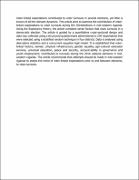The Contribution of Voter–Linked Expectations to Voter Turnouts in Mid-Western Uganda
Abstract
Voter-linked expectations contributed to voter turnouts in several elections, yet little is known of all the relevant dynamics. This article aims to examine the contribution of voter-linked expectations to voter turnouts during the 2016elections in mid-western Uganda. Using the Expectancy theory, the article considers seven factors that sway turnouts in a democratic election. The article is guided by a quantitative cross-sectional design and data was collected using a structured questionnaire administered to 230 respondents that were selected using a stratified random technique in four districts. Data is analysed using descriptive statistics and a concurrent equation logit model. It is established that voter-linked factors, namely: physical infrastructure, gender equality, agri-cultural extension services, universal education, peace and security, account-ability in governance and youth employment; contributed to turnouts during the 2016 national elections in mid-western Uganda. The article recommends that attempts should be made in mid-western Uganda to assess the trend of voter-linked expectations prior to and between elections, to raise turnouts.
Collections
- Research Articles [133]

